Corporate PPAs & Their Role In The Global Renewable Energy Transition
17 Jul 2023

As the world gradually shifts its focus towards sustainable energy solutions, corporate power purchase agreements (cPPAs) are emerging as a powerful driving force behind this transformative movement. From a business standpoint, the impetus is driven by two core elements: competitive pricing and the resilience of the renewable energy market.
These factors combine to create a prudent business case, with the added advantage of supporting the global transition to cleaner energy sources. The responsible expansion of renewable energy ensures that all stakeholders reap benefits in the long run.
These strategic contracts between companies and independent power producers (IPPs) act as catalysts for the growth and adoption of renewable energy, creating a win-win scenario for all parties involved.
In this article, we delve into the complexities of corporate PPAs, their functions, benefits, and the vast opportunities they present for businesses to contribute substantively to the energy transition.
We'll explore real-world case studies, demonstrating how corporate PPAs have been successfully implemented across a variety of industries. Additionally, we'll shed light on how platforms like PF Nexus are simplifying the process and assisting entities in finding the right cPPA opportunities.
Regardless of whether you're a tech giant, a pharmaceutical company, a steel producer, or operating in a different industry altogether, cPPAs offer a tailored, flexible solution that caters to your specific energy demands, propelling us towards a more sustainable energy future.
Read on to understand how corporate PPAs are revolutionising the energy landscape, setting the stage for a greener tomorrow.
What is a Corporate PPA?
A corporate power purchase agreement – part of the wider power purchase agreement (PPA) family – is a form of contract that enables companies to procure energy directly from independent power producers (IPPs), rather than purchasing power from their standard utility provider. The competitive pricing of renewable energy sources makes these agreements an attractive alternative to more traditional, non-renewable sources of power.
Despite the appeal of renewable energy projects, they often come with high initial costs and significant investment requirements. However, these risks can be mitigated through the use of corporate PPAs. These agreements can help insulate projects from potential fluctuations in electricity prices, minimise counterparty risk, and ensure a steady stream of revenue, thus facilitating access to low-cost debt and high financial leverage.
While agreeing on fixed prices might cause IPPs to miss out on potential market gains, the guaranteed cash flow significantly reduces the risk factor, enabling more projects to move past the planning stage.
For corporations, cPPAs present an opportunity to secure power at below-market rates, reduce operational costs, and cut greenhouse gas emissions, all while showcasing their commitment to sustainability.
Furthermore, the generated renewable energy can help companies qualify for Renewable Energy Certificates (RECs). These come in various forms and adhere to different standards depending on the jurisdiction. While most can be traded as assets, there are some that cannot.
cPPAs generally come in three basic formats: direct wire, sleeved (or pass-through/directed), and virtual/synthetic/financial.
Direct Wire
This type of PPA allows for power to be generated directly into the off-takers network. Typically, these projects are constructed on or near the off-takers site to minimise connection costs. While providing excellent security against non-energy and network fees, direct wire PPAs can pose challenges due to regulations and licensing.
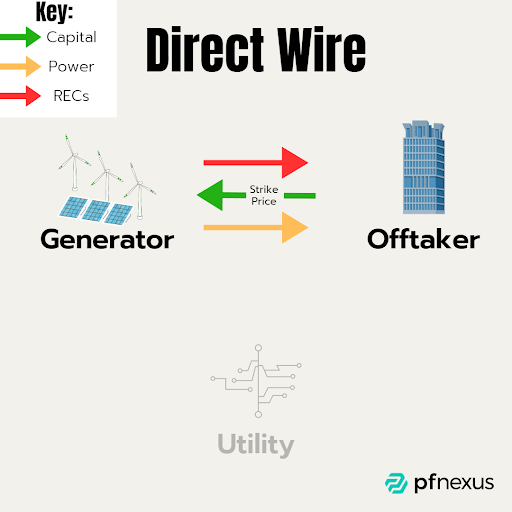
Sleeved (Pass-through/Directed)
In these agreements, utility companies supply the power generated by IPPs to off-takers for a fee. This arrangement enables the off-site generation of electricity to be delivered to the off-takers. The presence of the utility company as an intermediary simplifies the contract structure for the off-taker.
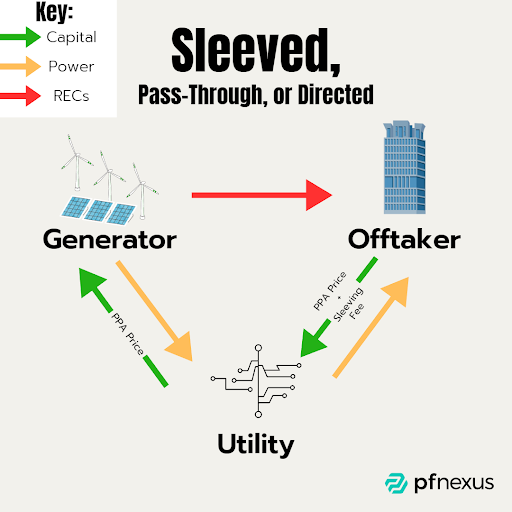
Virtual (Synthetic/Financial)
These PPAs are financial instruments resembling “Contracts for Difference” (CfDs). They do not require the power to be physically transmitted from the generator to the off-taker. Instead, they are typically used for hedging, both by the off-taker and the generator.
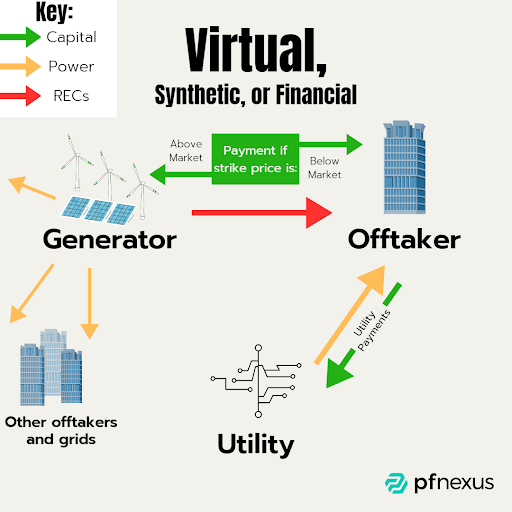
Virtual PPAs offer a great deal of flexibility - for instance, they can distribute generated power between multiple sites, unlike sleeved PPAs, which are limited to supporting those on the same grid. Take a look at our guide ‘Exploring Virtual Power Purchase Agreement’ to find out more.
How Does a Corporate PPA Work?
Engaging in a corporate power purchase agreement (cPPA) can yield significant rewards, but it requires the involved parties to navigate its complexities carefully.
First and foremost, potential buyers should establish whether a PPA is the most viable option for their needs. Several fundamental considerations include:
- Determining the technology to be used
- Whether the PPA should be physical or virtual
- The extent of their energy demand
- Their risk tolerance
Subsequently, buyers must ascertain whether they possess the necessary purchasing power to engage in the agreement independently or if they need to form a consortium with other businesses. If they choose the latter, an internal governance structure must be established to address potential disagreements.
While buyers organise their power procurement strategy, renewable energy projects evaluate the creditworthiness of their potential off-takers. The success of a project hinges on its ability to become operational, pay off debt, and turn a profit. Off-takers play a pivotal role in all three aspects, representing the foundation against which project owners borrow funds to complete the project - a process known as project financing.
Once both buyer and seller agree to enter a contract, negotiations begin.
To ensure equitable and favourable terms, hiring advisors is recommended. Most buyers lack familiarity with the renewable energy sector, and advisors can help mitigate unseen potential risks. They can also help navigate applicable regulations, especially in cross-border projects, where differing standards and bureaucratic challenges might arise.
Two of the critical risk factors for buyers are the pricing structure and contract length. Typically, pricing escalates over time in line with a pre-agreed index, such as the domestic Consumer Price Index (CPI) or a similar, routinely published index.
For stakeholders of virtual power purchase agreements (vPPAs), power price risk is the greatest concern. A prolonged period below the strike price could lead to significant costs.
Equally important is the creditworthiness of the seller; if the seller goes bankrupt or defaults, the investors may not receive their obligated payments when market prices rise above the strike price.
Concerning contract length, buyers typically dictate the length based on their needs and risk tolerance. Some might opt for shorter contracts with options to renew or transfer obligations, especially if they consider the vPPA risky. Others might find a 10 or 20+ year contract more prudent.
For project developers, contract lengths serve as tools to ensure project success. Some might choose short-term contracts during market highs to maximise potential short-term gains. However, this strategy must be balanced against reduced borrowing capacity and less financial predictability. Other developers might prefer longer-term contracts for gradual but predictable gains and higher upfront bankability.
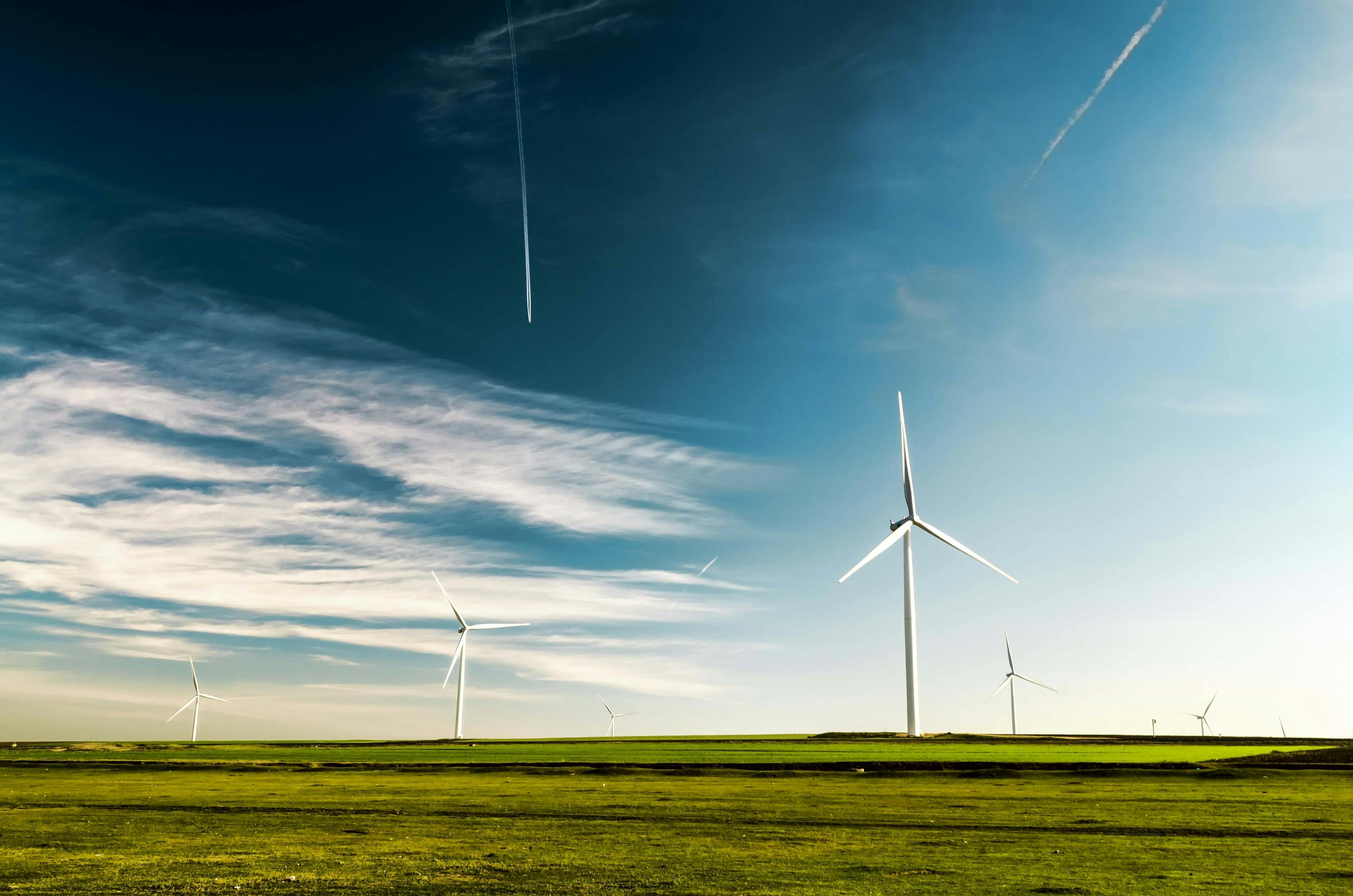
The Benefits of Corporate PPAs
Corporate power purchase agreements (cPPAs) offer a range of multidimensional benefits to all parties involved.
From the buyer's perspective, the benefits are both financial and societal. A well-negotiated cPPA can result in substantial long-term savings by mitigating power price risk.
Recent global events, such as the COVID-19 pandemic and the 2022 Russian Invasion of Ukraine, have demonstrated the volatility of energy markets reliant on imports (like Italy – see our guide on Italy’s renewable energy landscape for more). Long-term price stability not only reduces costs but also facilitates financial forecasting and informed business decision-making.
Moreover, cPPAs enhance a company's reputation by signalling its commitment to sustainability in an increasingly environmentally-conscious world.
Consumers are demanding more from companies in terms of renewable energy prioritization, and cPPAs provide tangible evidence of a company's use of renewable energy sources. This societal demand spurs governments to support the transition to renewable energy.
Subsidies and regulatory incentives are often provided to companies engaged in cPPAs, further promoting the proliferation of renewable energy. Both buyers and sellers benefit from such incentives, earning support and funding for their contributions to reducing greenhouse gas emissions and combating global warming.
Sellers also derive significant benefits from corporate PPAs. Primarily, cPPAs help sellers mitigate electricity price risk.
They exchange potential market gains for access to low-cost initial capital and ensure a steady income for the project, though counterparty risk must be considered. For instance, a significant risk comes from the buyer's ability to make payments. However, cPPAs make income predictable, reassuring lenders of repayments even during market downturns.
Another indirect benefit for sellers is access to cheaper capital in the form of debt. Renewable energy projects are often structured as Special Purpose Vehicles (SPVs), separate financial and legal entities from the parent company. SPVs enable the parent company to amalgamate various capital sources, reducing costs over time and supporting the simultaneous development of multiple projects.
Beyond financial benefits, cPPAs also contribute to environmental and societal well-being. By partnering with renewable energy projects, corporations decrease their greenhouse gas emissions, supporting the global transition to sustainable energy.
Furthermore, the installation of renewable energy projects generates local employment opportunities, as these projects require construction and maintenance.
Showcasing Success: Notable Corporate PPA Implementations
In April 2022, Meta inked a solar PPA deal with EDP Renewables, securing 156 MW of solar energy hailing from Texas. This corporate PPA will provide essential funding for the Cattlemen Solar Parm, a proposed 240 MW capacity solar farm set to be operational by 2023. The solar farm will energise Meta's Texas-based data centres, stimulate local economies, and generate jobs.
By September 2022, construction had commenced, creating 400 jobs for the construction phase and many more for long-term operations. Joining Meta in supporting the Cattlemen Solar Farm, Bristol Myers Squibb also agreed to a PPA, securing 60 MW of power.
As a side note, take a look at our guides on solar if you’d like to find out more about what it takes to start a solar farm, the solar project development process or, what it takes to secure solar power project financing.
Fast forward to April of the present year, Salzgitter Flachstahl GmbH, one of Germany's most prominent steel producers, committed to a 114 MW cPPA for 15 years. The PPA will finance an offshore wind farm in the German Baltic Sea, expected to be up and running by the end of 2024. Notably, the wind farm will bolster the production of green hydrogen, a crucial element in steel manufacturing.
The production of hydrogen is directly tied to energy costs via electrolysis. Presently, natural gas-derived hydrogen (termed blue hydrogen) is more cost-effective than green hydrogen. However, the 2022 Russian Invasion of Ukraine exposed the volatility of gas prices. By entering into a cPPA, Salzgitter aims to hedge against unexpected price surges, while future-proofing operations in anticipation of a projected reduction in hydrogen production costs by 2030.
The application of cPPAs transcends industry boundaries and diverse types of buyers. Meta operates within the tech industry, Bristol Myers Squibb is a pharmaceutical enterprise, and Salzgitter Flachstahl is a steel manufacturing entity. Each has its unique requirements, yet cPPAs provide the scalability and flexibility necessary to cater to these varied demands.
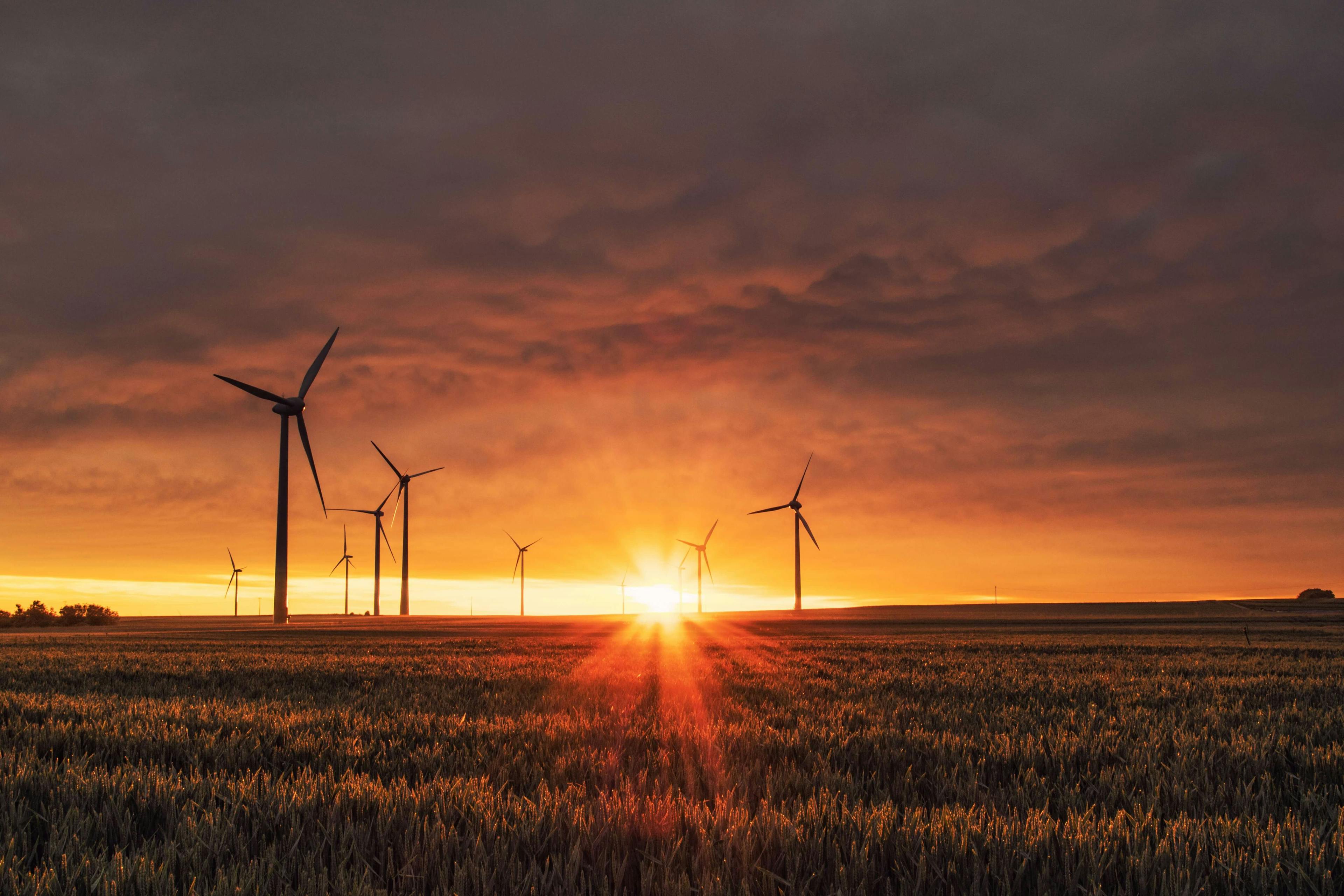
PF Nexus: A Catalyst for the Energy Transition
PF Nexus serves as an innovative platform, geared towards accelerating the energy transition by aiding renewable energy developers in identifying the best investment partnerships. Whether you're selling a project, seeking a joint venture partner, or in pursuit of scalable deal flow, our network of 4,600 investors, developers, and advisors offers the essential connections you need.
Our subscribers enjoy unrestricted access to both our renewable energy project marketplace and our extensive ecosystem database, thereby enhancing their decision-making process. Our platform provides a broad range of opportunities across diverse renewable energy technologies, including wind, solar, biomass, hydrogen, storage, and more. Furthermore, PF Nexus fosters an environment conducive to interaction and collaboration among investors, advisors, and developers, turning mandates into proactive measures.
The marketplace caters to both developers in search of investors and investors looking for lucrative projects, aiding them in maximising sale prices and saving time, thus facilitating the industry's growth.
Recently, a renowned developer in the UK leveraged the PF Nexus marketplace to supplement their standard asset sale process. A month later, when they reviewed their Non-Binding Offers (NBOs), they found that over 80% of the NBOs received came through PF Nexus, including the highest offer. This strategic use of PF Nexus led to a 400% increase in NBOs!
Sign up today for free and explore the boundless opportunities that PF Nexus has in store for you!
Signing Off
As instrumental pillars of the global energy transition, corporate power purchase agreements play a significant role in securing energy price stability and financing the shift towards sustainable green energy. Featuring an array of customisable structures, cPPAs are uniquely adaptable, designed to cater to a wide variety of customer requirements.
The rewards of engaging in cPPAs span numerous facets. Participants enjoy diverse advantages ranging from financial gains and robust risk management strategies to substantial environmental contributions.
As the renewable energy sector continues to expand – and with an increasing number of companies expressing interest in cPPAs – platforms like PF Nexus can provide invaluable assistance, simplifying the decision-making process.
Through cPPAs, prudent business decisions pave the way for the construction of a more sustainable energy future. In essence, cPPAs offer more than just a pathway towards renewable energy; they represent a crucial mechanism for driving change, setting the stage for a greener, more resilient tomorrow.
Sources